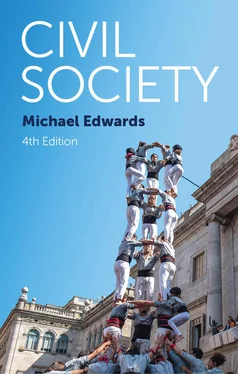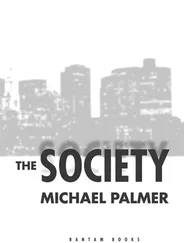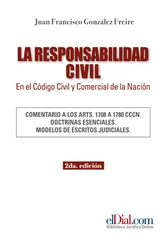Reviving civil society in the face of repression, polarization, and inequality is both a personal and a political (or institutional) challenge. Do we want to build an authentic civil society or not? If we disagree on what that means, do we want to be part of a democratic dialogue to find out? And since dialogues at present are neither civil nor democratic, are we at least committed to building the conditions in which everyone can participate so that we can start a different conversation with each other instead of shouting from our separate bunkers? Anything that brings people closer together rather than forcing them apart will help; anything that generates honest conversation instead of fake news and propaganda can move us forward; and anything that enriches the quality of life rather than diminishing it deserves our attention. These are all ways to build a civil society that’s worthy of the name. The rest is up to us.
1 Ripley (2018). 2 Rutzen (2015); CIVICUS (2018). 3 https://www.theguardian.com/world/2019/jan/16/brazil-environment-chief-accused-of-war-on-ngos-as-partnerships-paused4 Skocpol and Williamson (2012). 5 Cramer (2016); Hochschild (2018). 6 https://www.cnn.com/2018/08/27/politics/john-mccain-farewell-statement/index.html7 Lindsay (2018). 8 Edwards (2018b).
My thanks go to all those who have provided feedback on the third edition of Civil Society since its publication in 2014, and who have supplied me with a rich array of additional references, case studies, and other source material. Naturally, responsibility for all errors and omissions in the book remains mine. I have received excellent support and guidance from Jonathan Skerrett and Karina Jákupsdóttir at Polity Press in Cambridge, while three anonymous reviewers made valuable suggestions on an earlier draft. The revisions for this book were completed at our home in upstate New York, where my wife Cora is blazing a trail for true democracy and decency in government. As my own “civil society,” this book continues to be dedicated to her.
Michael Edwards
Swan Hill
March 2019
1 Introduction – What’s the Big Idea?
Set into the wall of the Church of the Ascension on London’s Blackheath is a small metal plaque. “Fellowship is life,” it reads, “and lack of fellowship is death, but in hell there is no brotherhood but every man for himself.” John Ball, the leader of the Peasants’ Revolt who spoke these words nearby in 1381, would not have thought of himself as part of “civil society,” but his sentiments have been echoed down the centuries by anyone who has ever joined a group, formed an association, or volunteered to defend or advance the causes they believed in. Collective action in search of the good society is a universal part of human experience, though manifested in a million different ways across time, space, and culture. In Sullivan County, New York, where I live, I am surrounded by contemporary examples of the same phenomenon – the volunteer fire service, the free giveaway of hay to those who can’t afford to buy it for their pets, the music sale by Radio W-JEFF (“America’s only hydro-powered public radio station”), the community activists at Swan Lake Renaissance who are my neighbors, and a myriad of other groups that cater to every affinity and interest. Yet Sullivan County remains economically depressed and politically divided, one more set of communities on the margins of a nation that is increasingly violent, unequal, and apparently incapable of resolving its own pressing social problems. A strong civil society, it seems, is no guarantee that society will be strong and civil, especially when citizens themselves become so polarized.
The question of how to connect these two sides of the civil society equation – collective action and the good society – has exercised the imaginations of thinkers and doers for hundreds of years, generating a vast literature and a universe of diverse experiences in the process. As we shall see, a third dimension of civil society – the public sphere – can play a major role in answering this question, but there’s no doubt that this debate is full of confusions and contradictions. Depending on whose version one follows, civil society is either a specific product of the nation-state and capitalism that arose spontaneously to mediate conflicts between social life and the market economy when the industrial revolution fractured traditional bonds of kin and community; or a universal expression of the collective life of individuals, at work in all societies but expressed in different ways according to their history, politics, and culture. Some see civil society as one of three sectors (along with the state and the market), separate from and independent of each other though sometimes overlapping in the middle. Others emphasize the “fuzzy” borders and interrelationships that exist between these sectors, increasingly characterized by hybrids of various kinds. Some claim that only certain associations are part of civil society – voluntary, democratic, modern, and “civil” according to some predefined set of normative criteria – while others insist that all associations qualify for membership, including “uncivil” societies and traditional associations that are based on inherited characteristics like ethnicity. Are families “in” or “out,” and what about the business sector? Is civil society a bulwark against the state, an indispensable support for government reformers, or dependent on state intervention for its continued existence? Is it the key to individual freedom through the guaranteed experience of pluralism or a threat to democracy through special-interest politics? Is it a noun (a part of society), an adjective (a kind of society), an arena for societal deliberation, or a mixture of all three?
It is not difficult to find support for all of these positions since civil society is popular across the political spectrum and among radically different intellectual traditions. “One man’s dirty trick is another man’s civic participation,” as the US Republican Party operative Roger Stone told the Guardian newspaper in 2017. 1Admittedly, that’s an extreme position, but what is to be done with a concept that seems so unsure of itself that definitions are akin to nailing jelly to the wall? One response would be to ditch the concept completely, but that would be a serious mistake. It would leave us short of the analytical tools we need to understand what happens in politics and social change, which cannot be explained or addressed through state-centric thinking or market-centric models by themselves. A second response would be to choose one interpretation of civil society and forget about the rest, but that would deprive the debate of all the richness and diversity that makes it so interesting and engaging. So the best way forward is to struggle through all the different theories and experiences with a critical and focused mind in order to see where that leads us. Ideas about the civil sphere can prosper in a rigorous critique so long as we abandon false universals, magic bullets, and painless panaceas. The goal is not consensus (something that would be impossible to achieve in the civil society debate) but greater clarity. And greater clarity, I hope, can be the basis for a better conversation about these ideas in the future.
Civil society: a very brief history of an idea
The first step in achieving greater clarity is to identify the origins of different contemporary understandings of civil society in the history of political thought. This is not a theoretical book, nor a book about civil society theory, but, in order to appreciate the ways in which theory has been muddled and misapplied in practice, a quick tour through theory is essential. As Keynes’s famous dictum reminds us, “practical men in authority who think themselves immune from theoretical influences are usually the slaves of some defunct economist,” just as present-day “civil society builders” are motivated, consciously or not, by ideas that are deeply rooted in the past.
Читать дальше












